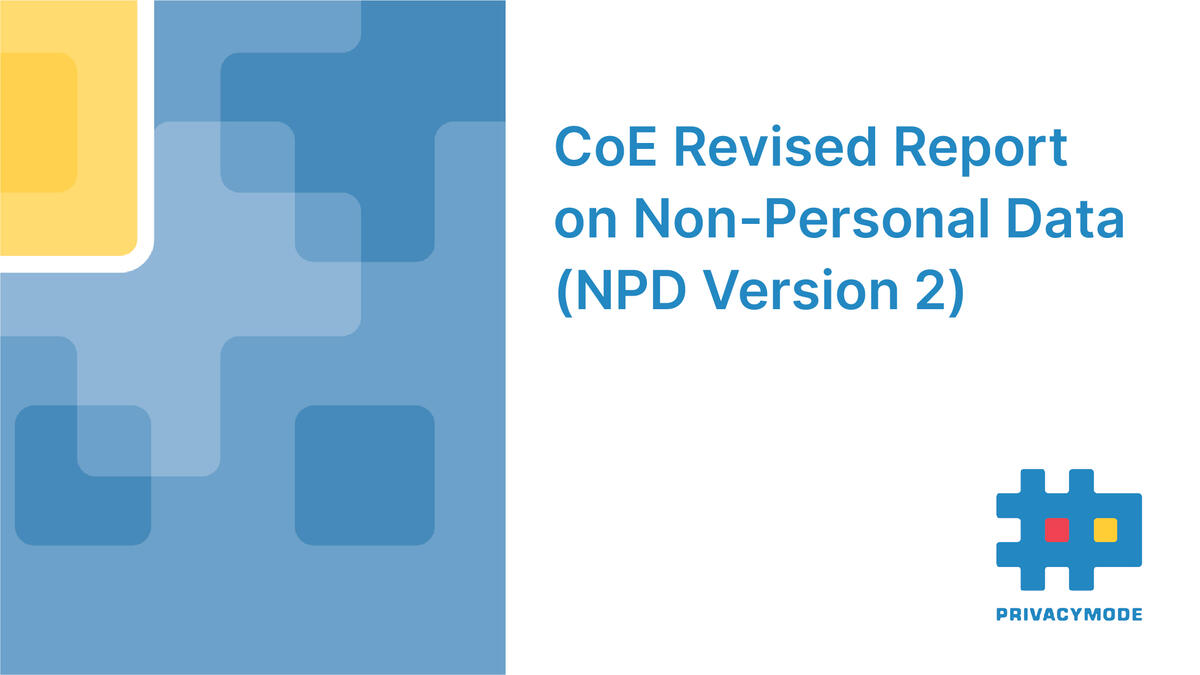
SH
Shubhangi Heda
@hpk0JE1cF1
Economics and Incentives around Sharing Non-Personal Data for Public Benefit
Submitted Jan 18, 2021
• Revised report of the committee on NPD Governance Framework (the report), defines high valued datasets (HVD) as those which are beneficial to community and would be shared as a public good, subject to certain guidelines as prescribed by the report.
• A data trustee (which is either a government or non-governmental organization) is to identify this subset based on public interest of the community and the data business (data custodian which maybe both private and government organizations) are obligated to mandatorily share the data. Here, the responsibility of identification of HVD and subsequently requesting the HVD from data businesses and providing the HVD to the data requested lies with the data trustee.
• Moreover, the Non-Personal Data Authority (NPDA) is also responsible for maintaining data repository of metadata, which are to be mandatorily shared by the data businesses. Furthermore, the report prescribes for nominal charges to be paid to the data trustee by data requester for processing data request and reasonable charges to be paid to the data custodian for presenting, processing and collating the data.
Analysis of Economics of HVD Access as under the Revised Non-Personal Data Governance Report :-
• The economics around data is still evolving and different jurisdictions are giving varied resource attribution to data. For example, EU is now proposing to treat data as an infrastructure, and it has also classified data as an ‘experience good’, while U.S. sees data as a capital asset.
• Conceptually public goods are non-rivalrous and non-excludable in nature. The form in which non-personal data currently exists with private companies makes it non-rival and yet excludable due to existing intellectual property rights and its commercial value for businesses. This makes data a ‘club good’ or ‘impure public good’. Thus, in order to transition this data from ‘club good’ to ‘public good’, as intended by the report, the transition costs and associated externalities needs to be closely assessed.
• This is specifically important as ex-ante assessment of social benefit accruing from data is difficult. While the report intends that the benefits derived from data access would be available to larger community, however, certain excludability may emerge in instances of data usage by business or for businesses. In such cases, where improved public services resulting from data sharing are chargeable, the mandatory sharing of HVD ( with only caveat of adjudication by Non-Personal Data Authority in cases where data custodian denies the request) on just unspecified ‘reasonable charges’ becomes problematic. This may result in competition concerns and distrust in process of data sharing. Thus,‘one size fits all’ approach should be reconsidered to prescribe for adequate remuneration to the data supplier in cases of creation of chargeable public benefits.
• More generally, the responsibility for maintaining other public goods such as water or roads lies with the government; however the current framework differs in this regard. The transaction cost of creation, identification and fulfillment of the data sharing request have been transferred to the data trustee (government or non-governmental organization). However, in a situation where proper and sustainable incentive structures are not specified for data trustees it may lead for them to prioritize private interests rather than public interests. In this context, UK, which has done pilot project of data trustee model have emphasized on the need for ensuring appropriate funding models through which sustainability as well as independence of data trustees could be maintained.
• Apart from the cost to the data trustees, the report misses on predicting and internalizing the externalities and incentive misalignment which could be created. The report envisages sharing of HVD for community benefit; however they may not always be aligned with interest of the data supplier. For example, the data businesses may itself strategize to expand business or provide chargeable public benefits; or the data business maybe in the ‘business’ of providing data to government for carrying out its functions. This would create a direct conflict with the objective and purpose of these businesses with the objective of the report, creating disincentives. In such cases ‘proportionality’ needs to be struck between private costs (current and foreseeable) and public benefits. Overall, it needs to be ensured that the expected public benefits are more than the costs accrued for making the data available.
• For this, it needs to be clearly specified who is bearing the cost of every step for providing access to HVD and who is the targeted beneficiary. While, these maybe difficult to predict without undertaking an impact assessment, as a safeguard, a utilization plan for the HVD should be submitted with a data request. Alternatively, data business could also be given right to prescribe reasonable and necessary purpose limitation on the usage of data ( for example, through licensing), in certain circumstances.
• On the side of the data requestor, in order to fully realize the public interest potential of data, appropriate data infrastructure, technical capability to ensure usability of data, and proper network infrastructure is vital. These present entry level costs for data requestor, who can be only compensated if they make their services chargeable, unless there is government funding to cover such costs. This again presents a gap between intended public benefits and costs to realize and sustain that public benefit.
Comments
Hosted by
Deep dives into privacy and security, and understanding needs of the Indian tech ecosystem through guides, research, collaboration, events and conferences. Sponsors: Privacy Mode’s programmes are sponsored by:
more

{{ gettext('Login to leave a comment') }}
{{ gettext('Post a comment…') }}{{ errorMsg }}
{{ gettext('No comments posted yet') }}